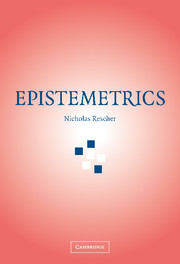Book contents
- Frontmatter
- Contents
- Preface
- 1 Asking for More Than Truth: Duhem's Law of Cognitive Complementarity
- 2 Kant's Conception of Knowledge as Systematized Information
- 3 Spencer's Law of Cognitive Development
- 4 Gibbon's Law of Logarithmic Returns
- 5 Adams's Thesis on Exponential Growth
- 6 Quality Retardation
- 7 How Much Can Be Known? A Leibnizian Perspective on the Quantitative Discrepancy Between Linguistic Truth and Objective Fact
- 8 On the Limits of Knowledge: A Kantian Perspective on Cognitive Finitude
- Conclusion
- Bibliography
- Index of Names
Preface
Published online by Cambridge University Press: 06 August 2009
- Frontmatter
- Contents
- Preface
- 1 Asking for More Than Truth: Duhem's Law of Cognitive Complementarity
- 2 Kant's Conception of Knowledge as Systematized Information
- 3 Spencer's Law of Cognitive Development
- 4 Gibbon's Law of Logarithmic Returns
- 5 Adams's Thesis on Exponential Growth
- 6 Quality Retardation
- 7 How Much Can Be Known? A Leibnizian Perspective on the Quantitative Discrepancy Between Linguistic Truth and Objective Fact
- 8 On the Limits of Knowledge: A Kantian Perspective on Cognitive Finitude
- Conclusion
- Bibliography
- Index of Names
Summary
When you can measure what you are speaking about, and express it in numbers, you know something about it; but when you cannot measure it, when you cannot express it in numbers, your knowledge is of a meager and unsatisfactory kind: it may be the beginning of knowledge, but you have scarcely, in your thoughts, advanced to the stage of science.
– William Thomson, Lord Kelvin (1824–1907), English PhysicistThis book develops the theory of knowledge from a quantitative perspective that serves to throw light on the scope and limits of human knowledge. It seeks to provide theorists of knowledge in philosophy, information theory, cognitive studies, communication theory, and cognate disciplines with the conceptual tools required for a quantitative treatment of the products of inquiry.
Kelvin's dictum is an exaggeration that takes things too far. I have never thought for a moment that if you cannot say it with numbers that it just is not worth saying. But all the same, I do firmly believe that where you cannot put numbers to work you will understand the matter better and more clearly for being able to explain why. So it seems well worth-while to see what a qualitative approach to knowledge can do for us.
The discipline represented by the domain of inquiry to which the present book is addressed does not as yet exist. Epistemetrics is not yet a scholarly specialty.
- Type
- Chapter
- Information
- Epistemetrics , pp. ix - xiiPublisher: Cambridge University PressPrint publication year: 2006



